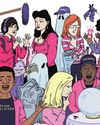
By
I magine finding out late in life that there's someone out there who looks just like you: same eyes, same nose, same mouth. Not a doppelganger, but a twin you never knew existed. Discovering that you're a twin is "a life-changing experience," says Nancy L Segal, a professor of psychology and the director of the Twin Studies Center at California State University, Fullerton.
Segal has written nine books on twins and is now working on her 10th. Over the years, she has come across at least 100 pairs of reared-apart twins. In most cases the twins were separated at birth and adopted by different families. "Adoptees often feel that something's missing in their lives," Segal says. "I think it relates to the fact they don't look like their family members. They don't feel a certain kind of belonging, even though they're loved. When they find a twin, they can see themselves in somebody else. And that's important." Through her research, Segal has found that twins are often similar even if they've grown up apart. "In personality, identical twins raised apart are as similar as identical twins raised together." This suggests we're similar to the people we live with because of the genes we share, rather than the environment. Segal has also found that identical reared-apart twins often feel closer than fraternal (non-identical) reared-apart twins. "What I've found even more striking is that when I've compared the twins' current closeness - both identical and fraternal to the adopted siblings they were raised with, they felt much closer with the twin. I've been surprised at how well they got along so quickly. It seemed as if they'd known each other all their lives." Here, people who have found their twin later in life share what it's like to discover this missing part of themselves.
'What freaks everybody out is our gestures'
Tim Carpenter and Bill Henry, 62
Bu hikaye The Guardian Weekly dergisinin October 04, 2024 sayısından alınmıştır.
Start your 7-day Magzter GOLD free trial to access thousands of curated premium stories, and 9,000+ magazines and newspapers.
Already a subscriber ? Giriş Yap
Bu hikaye The Guardian Weekly dergisinin October 04, 2024 sayısından alınmıştır.
Start your 7-day Magzter GOLD free trial to access thousands of curated premium stories, and 9,000+ magazines and newspapers.
Already a subscriber? Giriş Yap

Trump lives in a fantasy political world but reality will prevail
Why exactly is Donald Trump's new presidency so disorienting? So far, explanations have tended to focus on its manic pace, contempt for political conventions and blatant subversion of supposedly one of the world's most robust democracies.

'I curse this war': hunger and fear after rebel takeover
People living in Goma on the Democratic Republic of the Congo's eastern border with Rwanda have spoken of their fear and acute hunger after the M23 rebel group swept into the city last week.

The life aquatic
Adventurers have long wondered if we could live on the seabed. Now, 80 metres below the surface of a flooded quarry in the UK, we are about to find out

The secret to startup's rapid AI success
Who is behind DeepSeek and how did it achieve such an impressive feat in such a short time?
My inside story
Louise Lancaster was one of a group of Just Stop Oil activists given the longest-ever UK sentences for peaceful protest after blocking a motorway. Six months into her incarceration, the mother of three adult children reveals what she has learned about life in prison

What went wrong with the China-funded Dubai 2.0?
The city of Gwadar has a huge new airport, but suspicion of Beijing's true intentions threatens to wreck the project

Into the deep
The emergence of DeepSeek-a Chinese AI chatbot supposedly developed at a fraction of the cost of Silicon Valley models has stunned the US tech giants and potentially opened up the artificial intelligence race to a host of other players

Labour is sacrificing all to the god of GDP-and mocking objections
I can scarcely believe I'm writing this, but it's hard to dodge the conclusion. After 14 years of environmental vandalism, it might seem impossible for Labour to offer anything but improvement. But on green issues, this government is worse than the Tories.

Keeping up with Bridget Jones
Nearly 25 years after the first of the films about the ultimate singleton, Renée Zellweger discusses the resting place for her character's massive knickers

Fright club: why chills are hot
The paranormal has hit prime time, with scary podcasts and TV shows more popular than ever. Why does the unexplained have sucha holdonus?
